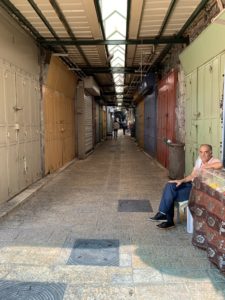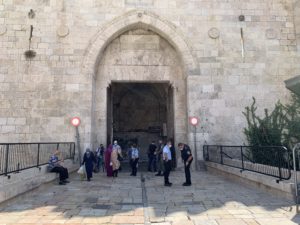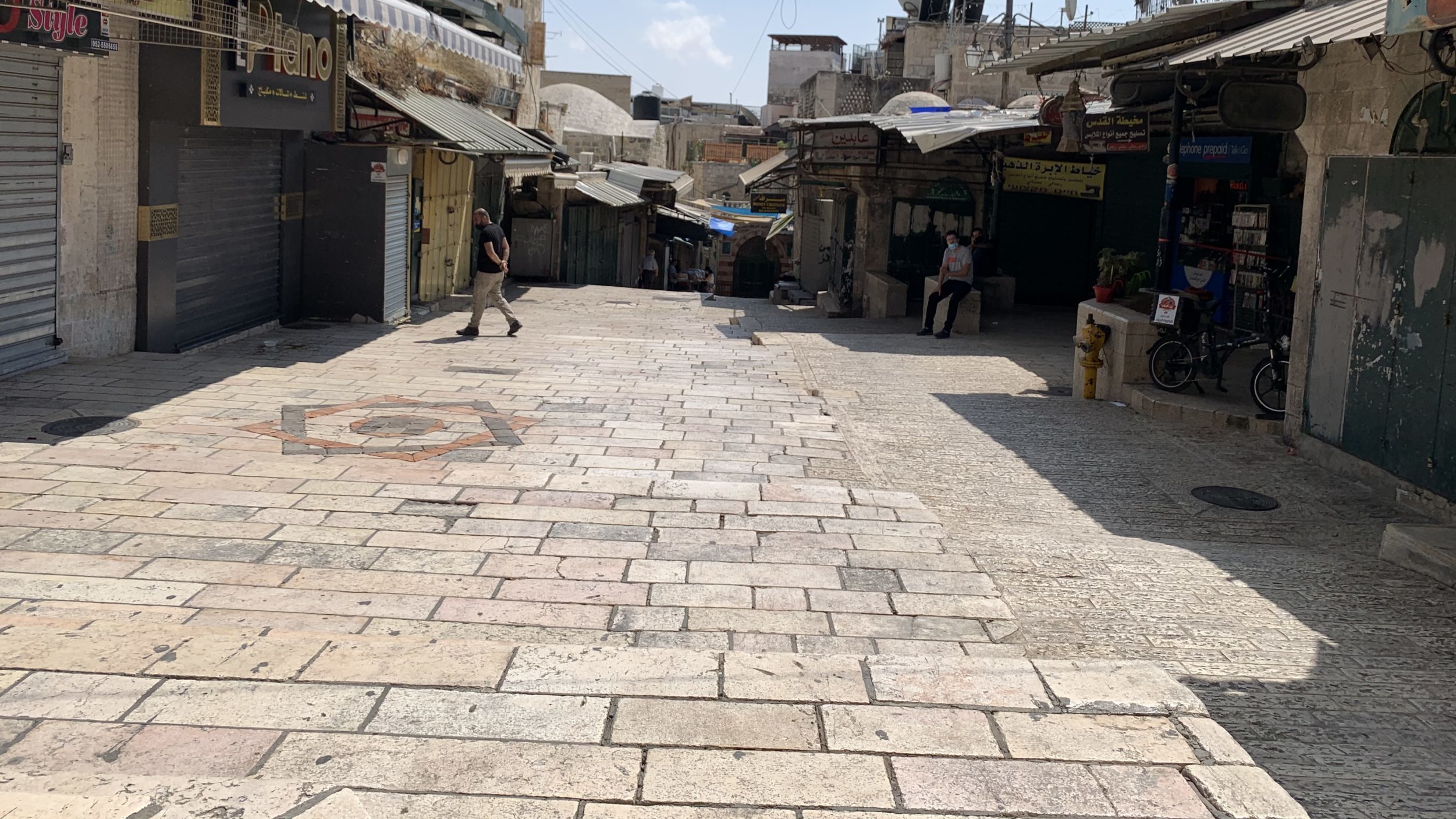Jerusalem Old City Merchants: Pandemic Restrictions Ruining Us (with VIDEO REPORT)
‘The government lets thousands protest and shop in the west of the city and doesn’t say anything to beachgoers. Why?’
On a normal day, the ancient bazaars, alleyways and holy sites of Jerusalem’s Old City bustle with tourists and shoppers. But now, the streets are eerily quiet because of the coronavirus pandemic.
The Old City stands deserted, a victim of the tough restrictions the Israeli government has put in place to contain the pandemic, measures merchants say have devastated their businesses. In addition, police have set up roadblocks outside all the Old City gates, allowing in only residents.
“Conditions are very difficult,” Haj Wadea Halawani, a local merchant, tells The Media Line. “The pandemic has affected the Jerusalem economy significantly. People who don’t live in the Old City are forbidden by the police from shopping here due to the closures.”
Halawani says his business is struggling and unless the restrictions are relaxed, it is going to get worse.
“My business can’t sustain itself by selling only to the Old City residents. We need the government to open things up and allow people to come in to shop,” he states, adding that his views reflect those of all the local merchants.
My business can’t sustain itself by selling only to the Old City residents. We need the government to open things up and allow people to come in to shop
Izzat Rajaby lives locally and has a café in the Muslim Quarter, near the Damascus Gate. He tells The Media Line that the government’s actions have been very bad for his business.
“Because of the coronavirus epidemic, I have had to close my coffee shop for long periods several times. That has killed our business. It’s total devastation,” he says.

A merchant wonders when he’ll see his next customer. (Mohammad Al-Kassim)
A few steps away from Rajaby’s café, in the Khan al-Zeit souk, sits a small pickle store owned by Abu Akram Meswadeh, who tells The Media Line that even though he is open, few people come by because most of the other shops are shuttered.
“All the stores are closed. There is no business. Our sales have dropped by more than 80%,” he says.
All the stores are closed. There is no business. Our sales have dropped by more than 80%
Shop owners say City Hall has offered only modest compensation. Rajaby calls it too little, too late.
“The municipality provides some aid to those who have registered with the Chamber of Commerce, but it is not sufficient,” he notes.
Meswadeh says he has yet to receive any compensation.
“It’s all empty talk,” he says. “We got nothing.”
More than three million people visit the Holy City in a normal year, but Halawani says that with worldwide closures, tourism has come to a complete stop.
Meswadeh agrees.
“The city depends on tourism, and without foreign tourism, the situation will not improve,” he laments.
The city depends on tourism, and without foreign tourism, the situation will not improve
The Via Dolorosa, believed to be the path that Jesus walked to the crucifixion, usually overflows with pilgrims and tourists. Now it is empty. The same goes for the courtyard facing the entrance to the Church of the Holy Sepulchre.
Only certain businesses that have been declared “essential,” such as pharmacies and grocery stores, are allowed to stay open.
Shops have had to endure one closure after another, devastating the Arab commercial sector. Shop owners are left with piling debt that they say puts their future at risk.
Halawani tells The Media Line that personal relations – for example, with suppliers – often play an important role in keeping a business afloat.
“If we have a friendly relationship with them, we ask that they be a little patient with us,” he says, referring to payments.
Halawani notes that the pandemic has also made consumers tighten their belts.
“It started last March when people began to watch their spending habits,” he says. “The coronavirus has made people spend less.”
He adds that even during the pandemic, the local government has refused to take sufficient action on lowering property taxes.
“The municipality said it will reduce the tax by 25%, but this is not enough,” he complains.
Further increasing tensions, some business owners accuse the central government of unequal restrictions.
“The government imposes a closure on the Old City while allowing thousands to demonstrate and shop in the western sector of the city, and doesn’t say anything to beachgoers. Why?” Halawani asks.
The government imposes a closure on the Old City while allowing thousands to demonstrate and shop in the western sector of the city, and doesn’t say anything to beachgoers. Why?

Police stand outside the Damascus Gate, allowing anyone to exit but only residents to enter. (Mohammad Al-Kassim)
On Thursday, Israel finally cracked down on those sectors, further tightening a nationwide lockdown – although this will be of no help to the merchants of Jerusalem’s Old City.


